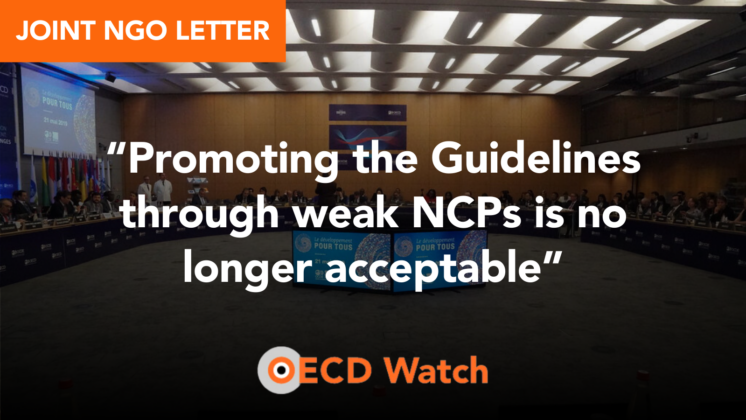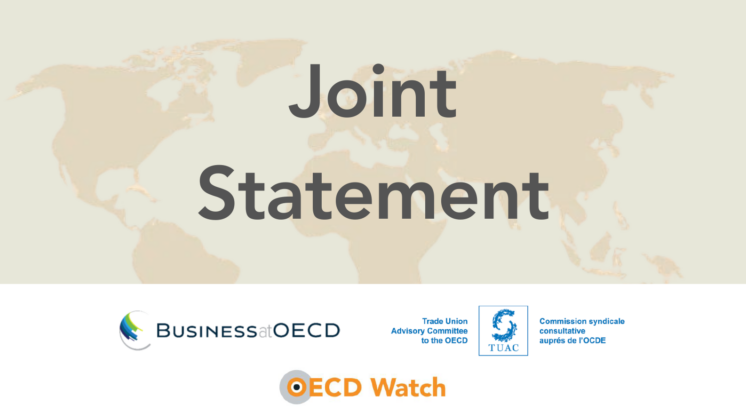OECD Watch’s “substantiated submission” calls on OECD to condemn undue pressure by corporations on governments and correct Canadian NCP’s non-transparent, unpredictable, and inequitable handling of complaint by civil society

In the second filing of its kind, OECD Watch has submitted a challenge to the OECD’s Investment Committee regarding the Canadian National Contact Point’s (NCP) handling of a complaint filed by Swiss NGO Bruno Manser Fonds (BMF) against Canadian real estate corporation Sakto. The NCP’s highly irregular procedures in rejecting the complaint raise concern the NCP’s decision-making was influenced by undue pressure from the corporation. The appeal argues the NCP failed to act with the OECD’s core values of transparency, accountability, predictability, impartiality, and equitability in handling the complaint, to the detriment of the civil society complainant and the complaint system as a whole. The appeal asks the OECD to confirm that the Canadian NCP failed to meet expected standards and urge the NCP to rectify the inequitable outcome for the notifier and adopt overall reforms. The appeal also asks the OECD to condemn undue pressure by corporations against NCP offices generally and guide governments in ensuring NCPs maintain impartiality when faced with pressure from corporations.
Underlying complaint
The complaint that was rejected by the Canadian NCP was filed by BMF against Canadian company Sakto, which has ties to a former Chief Minister in Malaysia, alleging that Sakto breached the OECD Guidelines’ disclosure requirements by failing adequately to disclose its sources of funding, beneficial owners, and other financial and governance data necessary to rule out suspicions the group has laundered the proceeds of corruption.
OECD Watch’s appeal does not express an opinion on the allegations raised in the underlying complaint, nor does it ask the OECD to address those allegations, but rather seeks accountability for the procedural failures of the Canadian NCP.
Canada in breach of core criteria and complaint handling principles of the OECD
The Canadian NCP’s handling of the complaint from 2016 to 2018 was highly irregular in ways contrary to the OECD’s expectations of NCPs and prejudicial to the civil society complainant. After receiving the complaint in January 2016, the NCP issued a draft “initial assessment” in October 2016 proposing to accept the complaint and determining that the claims were material and substantiated. Though the notifier agreed to the draft and to enter mediation with the company, in March 2017, the NCP reversed stance and shared with parties a draft “final statement” proposing to reject the complaint without any justification for the reversal in its decision. After repeatedly requesting and receiving no justification for the changed stance, and concerned the NCP had faced undue pressure from the company, BMF blew the whistle by publishing the conflicting draft statements in April 2017. The NCP responded by publishing in July 2017 a new final statement explaining detailed reasons for the complaint’s rejection, including that both the notifier and company had allegedly breached confidentiality expectations and that the company had allegedly asserted serious pressure on the NCP, including “Sakto involving a Member of Parliament during the confidential NCP assessment process; (…) Sakto’s aggressive challenge of the NCP’s jurisdiction; (…) Sakto’s legal counsel making submissions to the Government of Canada’s Deputy Minister of Justice…”.
Adding to the unpredictability of the process, the NCP inexplicably issued a second final statement in May 2018, after the first statement had been public on the NCP’s website for ten months, that retracted the July 2017 final statement and removed all mention of the company’s aggressive behaviour, instead implying only that the complaint was dismissed because of the complainant’s whistleblowing activity. The Canadian NCP also threatened OECD Watch and other civil society organisations fulfilling their appropriate monitoring role by asking the Canadian Department of Justice to send letters demanding that the organisations “cease and desist” from publicly sharing the Canadian NCP’s draft initial assessment.
Please see more information on the Canadian NCP’s handling of the underlying complaint in our complaint database.
Current challenge against the Canadian NCP
The Guidelines set expectations for NCPs to handle complaints predictably, impartially, equitably, and in a manner compatible with the Guidelines, and to act in accordance with core criteria of transparency and accountability, among others. Under the Guidelines, OECD Watch has a right to file a “substantiated submission” (akin to a procedural appeal) to the OECD Investment Committee if it believes an NCP has failed to fulfill its responsibilities with regard to its handling of a specific instance. OECD Watch may also ask the Investment Committee to make recommendations to improve the functioning of NCPs and the effective implementation of the Guidelines.
Goals of filing the submission
The Canadian NCP’s handling of the complaint was inequitable and partial in a manner prejudicial the civil society organisation seeking to use the mechanism, and has jeopardized civil society’s confidence in the NCP. The NCP’s failure to maintain the confidence of stakeholders has been noted by many observers, including the UN Working Group on Business & Human Rights in the UNWG’s 2017 country report on Canada and other OECD NCPs via the Canadian NCP’s 2019 peer review. OECD Watch seeks confirmation by the Investment Committee that the NCP has failed to meet expected standards, and calls on the Committee to issue recommendations to the Canadian government to rectify the inequitable outcome for the notifier and reform the Canadian NCP’s structure and practices moving forward to regain the confidence of stakeholders.
Additionally, OECD Watch seeks to draw attention to a broader concern that corporations are exerting undue pressure on NCP grievance mechanisms that are ill-prepared to withstand such pressure. The role of corporations in threatening human rights defenders has long been acknowledged. In a broader context of shrinking civil society space and corporate “capture” of government institutions, the UN Working Group on Business and Human Rights has noted that “there is growing concern about the role of business in causing, contributing, or being directly linked to attacks against human rights defenders, or in failing to take action against such attacks.” OECD Watch and the Business & Human Rights Resource Centre have published research documenting a high incidence of threats and attacks to defenders involved in matters subject to OECD Guidelines complaints. And in 2020, responding to a number of very serious threats against defenders filing Guidelines complaints, the Investment Committee’s Working Party on Responsible Business Conduct issued a statement asserting it was “deeply concerned by a number of alleged incidents of undue pressure intended to silence those who submit cases” to NCPs. The statement noted that “incidents of this kind undermine the NCP process and risk weakening the NCP system as a whole as well as the effectiveness of the Guidelines.”
As this submission seeks to demonstrate, corporate pressure is being placed not only on civil society users of the system, but on NCPs themselves. OECD Watch’s view is that incidents of this kind also undermine the NCP process and weaken the NCP system as a whole as well as the effectiveness of the Guidelines. Through shining a light on this challenge faced by many NCPs, OECD Watch seeks to generate discussion and responsive action from OECD states to address corporate threats against NCPs. OECD Watch is calling for the Investment Committee to condemn pressure by companies against the NCP grievance mechanisms and guide NCPs on how to maintain impartiality when faced with pressure from corporations.
OECD Watch appreciates the engagement of the Canadian NCP in seeking to address the concerns raised and has confidence the NCP will work to address them. OECD Watch makes this filing in good faith that, with support of the Investment Committee and its Working Party on Responsible Business Conduct, it can work together with the Canadian NCP to achieve a constructive resolution of the issues presented.
About the OECD Guidelines for Multinational Enterprises
The Guidelines are a set of international, state-backed, voluntary standards for responsible business conduct by multinational corporations operating in or from OECD member states and other adhering countries. The Guidelines set standards on a range of topics including human rights, employment and industrial relations, the environment, combating bribery, consumer interests, information disclosure, and taxation. The 38 OECD member countries as well as many other countries that have adhered to the Guidelines are all legally bound to establish an NCP tasked with handling complaints alleging corporate non-compliance with the Guidelines that are filed by civil society organisations, trade unions, businesses, or victims of corporate misconduct. When operated in accordance with the core criteria and guiding principles for complaint-handling, NCPs have great potential to provide effective access to remedy for victims of adverse impacts from business activity.













